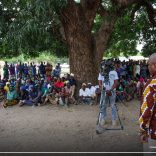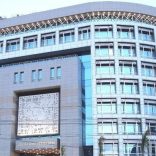Mozambique: Cabo Delgado governor says terrorists should use inclusive dialogue to voice grievances
Inauguration of Nacala Logistics Corridor to multiply exports from Mozambique

Macauhub (file photo) / A view of Nacala port
The Nacala Logistics Corridor, a 900-kilometre railroad and US$4.1 billion investment to bring coal from the Moatize mine to the port of Nacala, is to be inaugurated on Friday by the President of Mozambique, Filipe Nyusi.
Brazilian company Vale, which operates the mine in Tete province, and the Mozambique Railways Company (CFM) are partners in the investment, which included the construction of new sections of railway line and the rehabilitation of others, plus a 200-kilometre section crossing neighbouring Malawi.
With the ability to run up to two dozen coal trains daily, the goal is to export 18 million tonnes of coal a year via the newly constructed terminal at Nacala port in Nampula province, built to load freighters with coal in record time.
“Moatize coal is well positioned internationally to supply the global markets of Asia, Europe and Brazil at competitive cost,” Vale says, making Mozambique’s coal one of the jewels in the company’s crown.
The new infrastructure will mean a considerable increase in Mozambique’s export revenues, with the Economist magazine’s Intelligence Unit concluding in April that coal would top the list.
“The increase in production at the Moatize mine, from 8.7 million tonnes in 2016 to 13 million in 2017 and 18 million in 2018, is likely to be sufficient, on its own, for coal to exceed aluminium as the largest source of export revenues in Mozambique this year,” analysts at the unit write.
Even before exports began, coal mining in Tete province over the last decade had changed the socio-economic landscape, creating jobs and opening new business perspectives in services in the interior of Mozambique.
Now, the ambition is to make the Nacala Logistics Corridor a potent development driver.
According to consortium figures, during the construction phase the corridor has reached an estimated 10,000 people and now, in its operational phase, employs around 4,000 mostly Mozambican workers over its 900-kilometre extent.
The highly efficient railway will allow the movement of agricultural products and other products too, products which now suffer from the lack of bulk transport means or which are not economically viable when transported by road.
Optimism about the potential of the corridor and the resources of northern Mozambique dominates discussions. Export of the region’s abundant agricultural and forestry products should now become possible, and the corridor will attract new by-product factories linked to the expanding mining industry.
At the same time, the Nacala corridor will facilitate the transport of fuel and consumer goods to the interior of the country and to neighbouring countries such as Malawi and Zambia at competitive prices.
Next in line are the ENI and Anadarko natural gas mega-projects, which by 2023 alone will be generating fiscal revenues of EUR 1 billion a year, according to even the most conservative estimates.












Leave a Reply
Be the First to Comment!
You must be logged in to post a comment.
You must be logged in to post a comment.